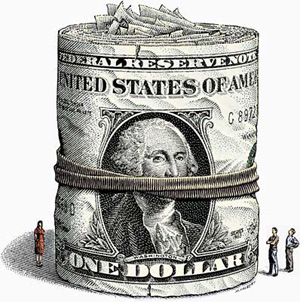what is money ?
By jayeshsj
@jayeshsj (41)
India
6 responses
@ramya186 (949)
• India
28 Dec 06
i think now money is the important think in the life ...that is very important ..... in olden days they give the respect to the person who r study r in good habit ...but now day only they r looking only the money if that person have the money then they r giveing respect to them .... i think it should not be there ... ok any way now days money is important ....
@suspanda (146)
• India
29 Dec 06
hi how are u??
Merry Christmas and an advance happy new year.
u can earn more revenue from the link below:
http://hits4pay.com/members/index.cgi?suspanda
I have signed up with 6 different money making sites, but trust me this is the best one i have ever seen.
@samimkardar (828)
• United States
3 Apr 07
Money is the important thing to spend a better life but not the everything for me. We can't deny the importance of money but we can't depend on it.
@mirceaeliade (631)
• Italy
28 Dec 06
This post is simily at tousand and tousand.
Stoping !!!!
Thanks for posting and welcome to mylot community.
Ettore
@zack_3004 (1207)
• Malaysia
12 Jan 07
Economics offers various definitions for money, though it is now commonly defined by the functions attached to any good or token that functions in trade as a medium of exchange, store of value, and unit of account. Some authors explicitly require money to be a standard of deferred payment, too[1]. In common usage, money refers more specifically to currency, particularly the many circulating currencies with legal tender status conferred by a national state; deposit accounts denominated in such currencies are also considered part of the money supply, although these characteristics are historically comparatively recent. Money may also serve as a means of rationing access to scarce resources and as a quantitative measure that provides a common standard for the comparison and valuation of quality as well as quantity, such as in the valuation of real estate or artistic works.
The use of money provides an alternative to barter, which is considered in a modern, complex economy to be inefficient because it requires a coincidence of wants between traders, and an agreement that these needs are of equal value, before a transaction can occur. The efficiency gains through the use of money are thought to encourage trade and the division of labour, in turn increasing productivity and wealth.
Like language, money is a social organization and civilizing force that provides a means and incentive for human beings to relate to one another economically by exchanging goods and services for mutual benefit. The capacity to convert perishable commodities and non-storable human labor into money provides a powerful incentive for people to produce more than they need for present personal consumption and to convert the surplus value into money so that it can be stored to meet future needs. Thus, the invention of money has stimulated the development of society by fostering hard work, higher productivity and continuous innovation. In addition to its economic functions and capacities, money has acquired other secondary social and psychological powers that may be exercises either by the expenditure of money or by its mere possession: these include the power to enhance popularity, status and prestige, the capacity to enhance the sense of self-worth, and the power to attain or influence political power.










